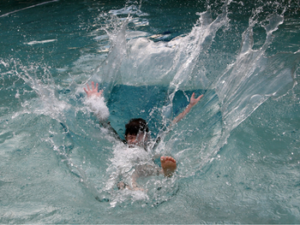Should baptized candidates celebrate their sacraments at the Easter Vigil?

Probably not, but there are exceptions. The National Statues for the Catechumenate tell us that baptized candidates should not celebrate their sacraments at the Easter Vigil so there won’t be any confusion between them and those who are being baptized (see no. 33).
Within the RCIA itself, we also find that the Easter Vigil might be the most appropriate place for baptized candidates to complete their initiation (see RCIA 409).
Why the discrepancy? It stems from the fact that we have different kinds of baptized candidates. The Rite of Christian Initiation of Adults, that is, the official rite of the church for adult initiation, is only concerned with unbaptized people and those who were baptized as infants and received no further Christian formation (see RCIA 400).
So when the RCIA says the Easter Vigil might be appropriate for baptized candidates to celebrate confirmation and eucharist, it is referring to those who made it to adulthood with no Christian formation. Those who were baptized in a tradition other than Roman Catholic and who have had some Christian formation would normally be received into full communion at a Sunday Mass in Ordinary Time (see RCIA 475 and National Statues for the Catechumenate 32).
What about Catholics who are completing their initiation through the sacrament of confirmation?
If a Catholic candidate has already celebrated first communion, he or she would not celebrate confirmation at the Easter Vigil. Having celebrated first communion means they have had some Christian formation after baptism (see RCIA 400). And they are not really candidates for adult initiation through the Rite of Christian Initiation of Adults. They are candidates for the Rite of Confirmation.
While confirmation is an initiation sacrament, it doesn’t really function that way when we celebrate it after first communion. We initiate people so that they can join with us at the eucharistic table. If they are already coming to communion, they are already initiated into the royal priesthood (see RCIA 217).
So who can celebrate their sacraments at the Easter Vigil?
Catechumens who have been elected by the bishop, for sure.
Baptized Catholics, who after infant baptism, received no further formation, including no formation for first communion, may complete their initiation at the Easter Vigil. But they do not have to wait until the Easter Vigil. They can complete their initiation as soon as they are ready. The National Statues for the Catechumenate suggest that a time other than the Easter Vigil would generally be more appropriate (see no. 26).
Protestants, who after infant baptism, received no further formation in Christian life may be received into full communion at the Easter Vigil. In practice, however, I would shy away from this option. The church says that we are to avoid big, flashy displays when people from other denominations are received into full communion (see RCIA 475). This is especially true when family members, who are still active members of their own churches, will be present for the reception into full communion.
The most pastoral practice might be for these candidates to be received at a Sunday Mass when they are ready (see National Statues for the Catechumenate 32-33).
What are some of the most common questions about the Easter Vigil?
Should we do conditional baptisms for those whom we are not sure were validly baptized?
Not at the Easter Vigil and probably not ever. The bar for validity is very low. The baptism must have been done with both water (pouring, sprinkling, or immersing the one baptized) and the Trinitarian formula (“I baptize you in the name of the Father, and of the Son, and of the Holy Spirit”). Also, the minister must intend to do what the church does when baptizing. You do not need a baptismal certificate to verify the baptism. You need some minimal evidence (such as photos of the baptism or the written testimony of a witness to the baptism) to verify the baptism occurred.
If you have serious doubts that a person was validly baptized, then you should probably treat him or her as a catechumen. You would then celebrate initiation with him or her in the normal way.
If, for some reason, you must celebrate a conditional baptism, it is done non-solemnly (see RCIA 480). The Easter Vigil is our most solemn celebration, so obviously that would not be the place for a nonsolemn conditional baptism.
What about children? Should they be initiated at the Easter Vigil? And can confirmation be postponed for pastoral reasons?
Unbaptized children who have reached catechetical age would normally be fully initiated at the Easter Vigil. “Catechetical age” is defined as having attained the use of reason. For most children, this occurs around age 7. But in some children, it may occur at a younger or older age. Age 7 is a guideline, not a rule (see RCIA 252-253).
Child catechumens may also celebrate their initiation at a Sunday Mass (see RCIA 304).
Whenever their initiation is celebrated, they are to receive all three sacraments of initiation (see RCIA 215 and 305, Canon Law 852 and 866, and National Statutes for the Catechumenate 18).
What do we do if someone’s annulment issues are not resolved in time for the Easter Vigil?
It is important to uncover any marriage-related impediments when you first meet an inquirer. It is equally important to avoid giving any kind of indication about when a person who was previously married may celebrate initiation or reception into full communion. If you have done a good job of that, there should be no expectation on the part of the catechumens or candidates that they will be initiated or received into full communion until after their marriage issues are resolved.
If the person seeking an annulment is already baptized, he or she can be received into full communion any time after the annulment happens. If he or she is unbaptized, initiation can occur outside the Easter Vigil in exceptional circumstances (see RCIA 331-335).
Your turn
What questions do you hear from your team, your elect, or your congregation about the Easter Vigil? Share them in the comments below!









Thank you and God bless you for all you do. You have no idea how timely these questions being answered now help our RCIA team
Because this year has had new challenges which of these questions most definitely address.
Again thank you for all you do and God bless you all.
Rick
Does the parish priest able to confer the Sacrament of Confirmation on a candidate for full communion outside the Easter Vigil, or does he have to receive formal permission from the diocesan bishop?
Hi Stephanie. For someone baptized in another tradition who wants to become Catholic, a priest would celebrate the Rite of Reception into the Full Communion of the Catholic Church (RCIA 473). Although many parishes celebrate this rite at the Easter Vigil, the norm is actually to celebrate it at a Sunday Mass.
In most dioceses, the bishop has delegated the authority to celebrate this rite to the priests of the diocese. The rite of reception includes the celebration of the sacrament of confirmation.
You might be interested in reading this article: https://teaminitiation.com/2020/08/can-rcia-seekers-celebrate-their-sacraments-outside-of-the-easter-vigil/
Thanks for your question.
Why are the prayers for Easter Vigil in the RCIA Rite (ritual) worded differently in the Roman Missal (revised 2011 translation)? Is the RCIA ritual book out of date?
Hi Brian,
All the rites of the church for the English-speaking church are being retranslated. One of the first to be retranslated was the Roman Missal. One of the last will be the Rite of Christian Initiation of Adults. The new translation has been completed and approved by the US bishops. Now it has to be approved by Rome. The earliest, most optimistic estimate of when we might have a final copy in hand is probably late 2023. See this post for more details: https://teaminitiation.com/2020/01/is-a-new-rcia-ocia-around-the-corner/
Why does the USCCB website say, “The Candidates may be received into the Catholic Church at the Easter Vigil or at another Sunday during the year depending on pastoral circumstances and readiness of the Candidate.”
https://www.usccb.org/beliefs-and-teachings/who-we-teach/christian-initiation-of-adults
If there are no catechumens, do you still advise against bringing candidates in at Easter Vigil? There seems to be a lot of conflicting information online.
Hi Faustina,
I would refer you back to what I wrote in the original article above:
So when the RCIA says the Easter Vigil might be appropriate for baptized candidates to celebrate confirmation and eucharist, it is referring to those who made it to adulthood with no Christian formation. Those who were baptized in a tradition other than Roman Catholic and who have had some Christian formation would normally be received into full communion at a Sunday Mass in Ordinary Time (see RCIA 475 and National Statues for the Catechumenate 32).
The USCCB site says essentially the same thing when it says “depending on pastoral circumstances.”
I agree there is a lot of conflicting information online. That’s why it is best to look to the source document itself for guidance, the Rite of Christian Initiation of Adults.